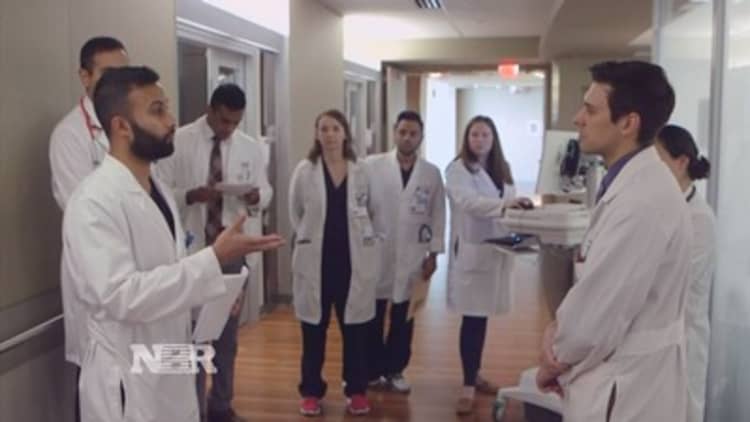
Vivian Butamanya left a human resources job last year to become a home health aide in the New York area. She wound up getting a bump in pay, but what she really values are the emotional rewards.
"It makes a huge difference. … It's not really like financial gains," Butamanya said. "To me, when you're appreciated by a client, as well as the person who employs you — it's more than anything."
As Americans are living longer, demand for home health care workers is growing, and for home care firms like Butamanya's employer, Right At Home, so is the competition to make dedicated workers feel valued.
"We're having to open up our pipeline. We're having to think innovatively," explained Brian Petranick, CEO of Right at Home. "We're looking at ways to certainly help with benefits and pay but also to provide even a better care experience for our workers, in general."
They're not alone. Hospital unemployment is now just 1.4 percent nationally, with administrators scrambling to fill jobs across a wide range of positions. In particular, they are facing shortages of primary care doctors and nursing staff.
At health centers such as OhioHealth Doctors Hospital in Columbus, physician recruiters are looking at incentives such as help with student loans to attract and retain new doctors.
"I was with one of my recruiters yesterday, and she was working with a hospitalist who had $500,000 in student loan debt. That's a pain point for a lot of physicians coming out — even for physicians who are practicing," said Chris Corde, OhioHealth vice president and head of physician recruitment.
The shortages have affected hiring. Hospital monthly employment growth has slowed about half a percentage point to 1.7 percent from 2.5 percent a year ago, according to data from the Bureau of Labor Statistics. While uncertainty over health-care regulation in Washington has given some health executives pause, the shortage of workers has also played a part in the slowdown.
It now takes a record 49 days to fill a health-care position, according to DHI Group, an employment consulting firm. That's two weeks longer than it now takes to fill a position in the highly competitive IT sector.
More health-care employers are trying to train the workforce that they need.
"The most innovative are the ones that are adding to their portfolios, and really going out and having an ongoing dialogue in the community, pipelining people, understanding who's in the market," said DHI CEO Mike Durney.
At Temple University Health system in Philadelphia, that has meant stepping up training for their current doctors in drug treatment as demand has grown in their community.
"The opioid epidemic has really highlighted the fact that we do not have enough people trained in addiction treatment," said Dr. Susan Freeman, chief medical officer.
While doctors have been trained in treating overdoses, they have asked for more training when it comes to overall addiction treatment.
"We are creating a center for addiction medicine to provide mentoring and training services" that their doctors are looking for, said Dr. Freeman.
At OhioHealth, they are also courting med students early, to develop a relationship as they start their careers.
"We are recruiting right now several urologists who are not going to be available until September 2019, but we're actively working with them," said Corde.
In an increasingly tight health-care hiring market, employers hope that the payoff will be finding qualified workers like Butamanya who will develop a strong connection to their team.
"It means a lot when your employer calls in and is like, 'Oh, we've had so much good stuff about you. The client really compliments you.' … That for me is everything," she said.


